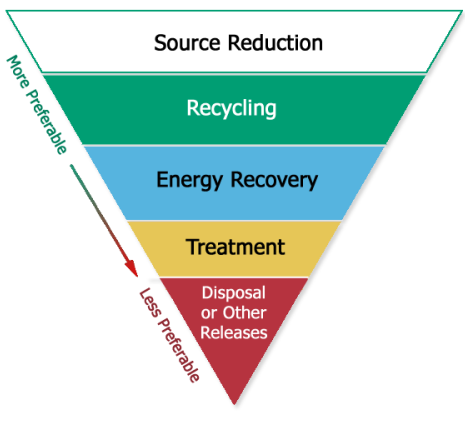Production Related Waste Management for Selected Chemical
lchemid=0000067561
Waste Management Comparison - 2021
Pollution Prevention Activities for Selected Chemical
| Reporting Year | Section 8.10: Newly Implemented Source Reduction Activity | Section 8.10: Methods to Identify Activity | Section 8.11: Optional Pollution Prevention Information* |
|---|---|---|---|
| 2019 |
Other Barriers to Source Reduction - Resource for reducing methanol would exceed the benefit and create more problematic emissions |
||
| 2017 |
Source Reduction:: W50: Optimized reaction conditions or otherwise increased efficiency of synthesis
|
Methods to Identify SR Opportunities: T03: Materials balance audits
|
|
| 2016 |
Other Barriers to Source Reduction - There is currently source reduction projects underway, though it may not be until 2018 when they are realized. |
||
| 2015 |
Source Reduction:: W52: Modified equipment, layout, or piping
|
Methods to Identify SR Opportunities: T11: Other
|
W52: Some dryers NG burners added, thus more efficiency achieved and cleaner fuel utilized. Also additional control equipment installed. Source Reduction - Some dryers NG burners added, thus more efficiency achieved and cleaner fuel utilized. Also additional control equipment installed. Source Reduction: Source Reduction - Some dryers NG burners added, thus more efficiency achieved and cleaner fuel utilized. Also additional control equipment installed. |
| 1993 |
Source Reduction:: W35: Installed vapor recovery systems
|
Methods to Identify SR Opportunities: T03: Materials balance audits
|
TRI Pollution Prevention Glossary
The Waste Management Hierarchy |
The waste management hierarchy established by the Pollution Prevention Act (PPA) guides waste generators toward the best options for managing wastes.
The preferred option is to prevent pollution at its source, but for waste that is generated, the preferred management methods are recycling, followed
by burning for energy recovery, treatment and, as a last resort, disposing of the waste.
|
- A breakdown of production-related waste managed. This includes all amounts of the chemical released directly to the environment or otherwise managed as waste, other than waste generated by one-time events not associated with normal production processes (e.g., fires or remedial actions).
- A production ratio or activity index to provide context for reported toxic chemical quantities. For example, if a chemical is used in the manufacture of refrigerators, the production index would track the number of refrigerators produced and could be used to help gauge how much of the chemical is being released per unit of production.
- Any newly implemented source reduction activities, reported using "W-codes" (e.g., "W41: Increased purity of raw materials")